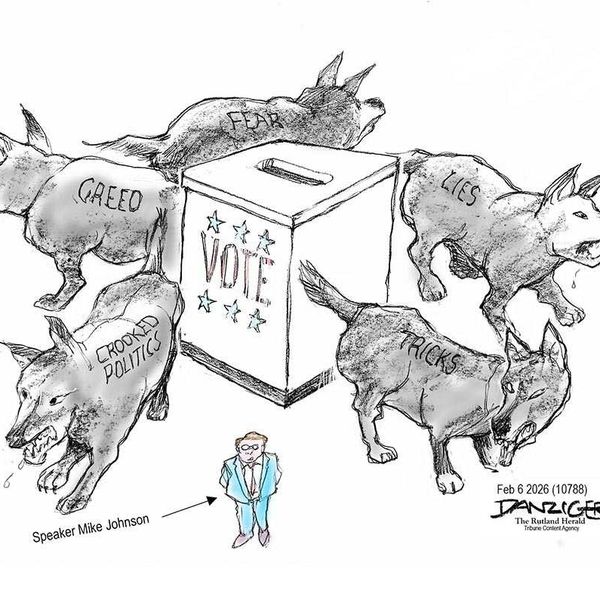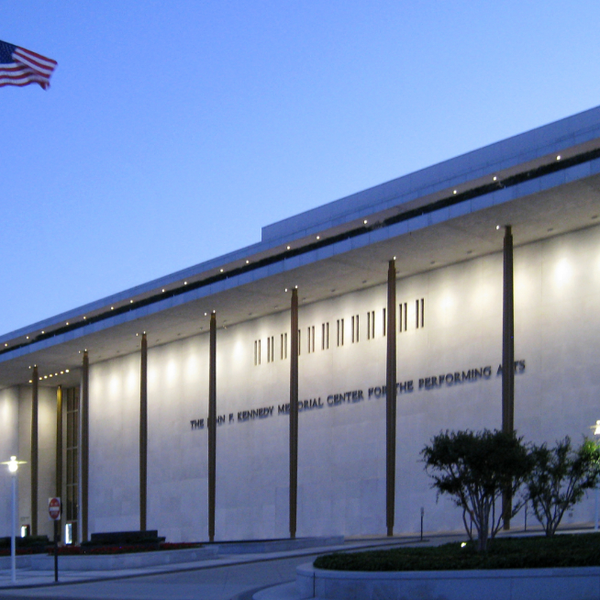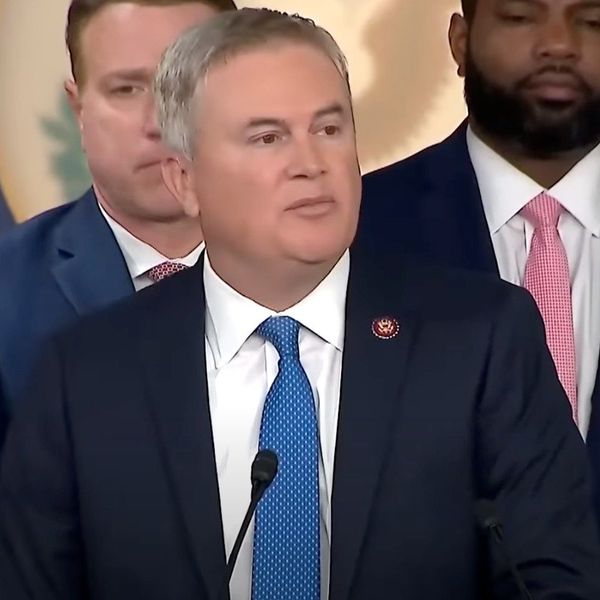Betraying His Oath: Trump Drags America Into The Ninth Circle Of Hell

Erik Siebert speaking to reporters at Justice Department, with Attorney General Pam Bondi in rear
In Dante Alighieri’s Inferno—the first book of The Divine Comedy—the Roman poet Virgil guides the author down through circles of Hell that house increasingly serious sinners. At the very bottom, the Ninth Circle, live traitors (“i traditori”), frozen in a lake of ice for their treachery.
It was not long ago that we were asking whether the Trump presidency had ushered in a constitutional crisis. We are light years past that point now, deep into an autocratic regime that in many essentials is indistinguishable from the most tyrannical strongman states.
In the past week in particular, Trump has taken action that amounts to the consummate betrayal of the most basic principle that we are a government of laws, not of man. In these two critical measures of democratic government—apolitical justice without fear or favor, and the freedom to criticize our leaders—Trump’s betrayal of the Constitution is manifest.
The Siebert Affair: Prosecutions Without Evidence
I begin with the consummate betrayal of the ideals the Department of Justice has long stood for. As a DOJ alum, it is my principal lookout, and I have not yet written about Friday’s forced resignation of U.S. Attorney Erik Siebert.
Siebert, a well-respected career prosecutor in the Eastern District of Virginia, whom Trump himself had nominated for the top job, was forced out after concluding that there was insufficient evidence to indict New York Attorney General Letitia James on mortgage fraud.
Siebert’s conduct was not disloyal, imprudent, or questionable in any way. On the contrary, it was the very definition of prosecutorial integrity.
The Justice Manual (formerly the U.S. Attorneys’ Manual) opens with the charging principle that no prosecution should be initiated unless admissible evidence is sufficient to obtain and sustain a conviction. That is not a suggestion; it is a constitutional and ethical command that embodies “justice without fear or favor.”
Forcing a prosecutor to stand in court and allege charges he or she knows cannot be proven is the gravest assault on justice imaginable, not to mention the Kafkaesque nightmare it imposes on the defendant.
Take this as me shouting from the rooftops: there is no greater abuse—none—than forcing a prosecutor to bring charges against the president’s political enemies without adequate evidence.
To fire a U.S. Attorney for following the evidence is not merely a personnel decision. It is a rock-bottom repudiation of what it means to be a prosecutor. It tells every AUSA in the country: indict the president’s enemies or risk your career. The damage is not confined to one office. It strikes at the justice system itself, which depends on prosecutors’ independence from political winds.
It also, incidentally, supplies Trump’s enemies with potent tools to challenge the corrupt prosecutions he wants his Department of Justice to bring. Selective prosecution is a defense that is extraordinarily hard to bring successfully. Under Wayte v. United States, a defendant must show both discriminatory effect (similarly situated people weren’t charged) and discriminatory purpose (the decision was made for an impermissible reason, like political animus).
But the sequence here—investigators find insufficient evidence; the U.S. Attorney refuses to indict; the prosecutor is removed; the President publicly demands prosecution anyway—creates what may be the strongest possible fact pattern for that defense. Any future case against James—or others on the enemies list, from Adam Schiff to Jim Comey—will be automatic fodder to claim selective prosecution.
The Department previously strong-armed its career prosecutors to drop charges in the Eric Adams prosecution, notwithstanding a solid basis in fact and law. This was the inverse sort of violation and, in its way, as radical a departure from the maxim that the department does justice without fear or favor.
But it is orders of magnitude less serious than the manufacture of charges against an innocent person. As the maxim goes, “better that ten guilty persons escape than that one innocent suffer.” When that innocent suffers not because of a breakdown of the system but because the president of the United States insists on it, we are at the nadir of injustice.
The contrast with the 2006 Bush Administration scandal over U.S. Attorney firings is instructive. Then, the mere suspicion that U.S. Attorneys were removed for declining to bring politically motivated charges triggered congressional hearings and national outcry, and led to the resignation of Attorney General Alberto Gonzales. By comparison, that was a garden-party controversy.
What was once enough to topple an attorney general has now been surpassed by orders of magnitude: the president himself publicly calling for prosecutions of political opponents, and the axe falling on prosecutors who refuse. We have crossed from questionable politics into authoritarian practice. In Russia, Turkey, or Hungary, prosecutors indict opponents on political command. Until now, never here.
But this case gets yet worse, incredibly enough. After Siebert was forced out, Trump sent a directive to AG Bondi to prosecute his former antagonists, such as Jim Comey, Adam Schiff, and James. Trump’s demand to Bondi: “We can’t delay any longer; it’s killing our reputation and credibility… They impeached me twice and indicted me (5 times). OVER NOTHING. JUSTICE MUST BE SERVED, NOW!!!”
Trump’s definition of justice is perfectly perverse and immoral. The men and women whom he proposes to have his Department of Justice charge with federal crimes are guilty of nothing more than carrying out their public duties during Trump’s first term.
Needless to say, Trump’s judgment has nothing to do with actual criminal guilt (though he screams that they must be guilty of something). He has said of James, “it looks like she’s very guilty of something, but I really don’t know.” It’s plain that her supposed guilt has nothing to do with mortgage fraud (as to which, by the way, the evidence of her innocence is strong), and everything to do with the cases she brought against him.
The Kimmel Affair: FCC as Speech Police
Move back now to the Jimmy Kimmel suspension. If Siebert’s firing represents the perversion of justice, Kimmel’s suspension represents the suffocation of core political speech.
The First Amendment prohibits government from regulating speech based on content, and especially on viewpoint. More, the criticism of the country’s leaders lies at the very epicenter of what the First Amendment protects, and what its protections are meant to achieve for the people.
The Supreme Court has applied the First Amendment to a broad spectrum of expression, including the exotic and the non-political. Its First Amendment cases run the gamut from beer ads to exotic dancing.
But more than anything, the provision was designed to safeguard the people’s ability to criticize leaders. It is a right that the framers understood as the foundation of every other freedom. Madison famously wrote, “the right of freely examining public characters and measures, and of free communication among the people thereon, is the only effectual guardian of every other right.”
Elsewhere, he explained that it is the nature of republican government that “we shall find that the censorial power is in the people over the government, and not in the government over the people.”
But that is not what we find in the country today. Instead, we see an Orwellian arrangement where business leaders, eager to curry favor, suppress speech preemptively to avoid the corrupt leverage of Trump’s executive power.
That is the dynamic here. Networks and executives know their bottom line depends on staying in the administration’s good graces. The FCC controls licensing, fines, and investigations. The President’s public wrath is the first domino; the agency’s shadow power does the rest. Everyone understands the threat hanging overhead. Executives preemptively comply. For you and me, there is no difference from a direct government command not to criticize the President.
Free speech is ultimately instrumental. It ensures accountability, fosters wisdom, protects against civil violence, and more; in essence, it underwrites every other liberty.
As in other areas of Trump’s control over the private sector—law firms, universities, media—once one entity caves, fear compounds and repression spreads.
And where do the people, for whom the First Amendment exists, fit into this model? Nowhere. They are mass casualties.
Dante imagined the deepest circle of Hell reserved for betrayal—the violation of fundamental trust. That seems apt. Trump’s recent conduct betrays not only his political opponents but the very architecture of democratic life.
Silencing comedians and purging prosecutors are not isolated controversies. They are part of a systematic strategy: to shrink the realm of free speech and to corrupt the machinery of justice. Both are indispensable pillars of the republic. Eliminate them, and it is hard to imagine how the democracy survives.
It is tempting to say we are drifting toward authoritarianism. But drift suggests passivity. What we are witnessing is active demolition. The FCC, the DOJ, the very norms of free expression and prosecutorial independence—they are being repurposed as weapons. That is not a misstep. It is the design.
Trump, the worst traitor to the Constitution in the history of the U.S. presidency, is dragging the country into the Ninth Circle of Hell.Harry Litman is a former United States Attorney and the executive producer and host of the Talking Feds podcast. He has taught law at UCLA, Berkeley, and Georgetown and served as a deputy assistant attorney general in the Clinton Administration. Please consider subscribing to Talking Feds on Substack.
Reprinted with permission from Talking Feds








